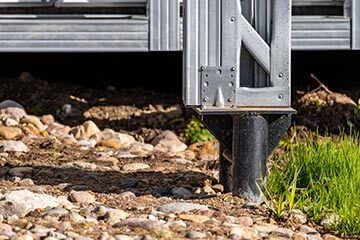Frozen pipes are one of the most common winter home insurance claims, but keeping your heating on low and letting taps drip in freezing weather could help stop a burst pipe before it starts.

Key takeaways
- Most home insurance covers sudden ‘escape of water’ like burst pipes
- Wear and tear (like corrosion or ageing pipes) isn’t normally covered
- Frozen pipes are typically covered for damage, but not if your home’s been empty for over 30 days
- Winter hack: keep heating ticking over and let taps drip during cold snaps to help prevent freezing
What is water damage insurance?
Insurers tend to call water damage insurance 'escape of water'. It covers sudden accidental and sudden water damage caused by burst pipes and anything else that could cause this. It also covers your stuff if it's damaged by water.
According to the ABI, insurers pay out £1.8 million every day for escape of water damage. It's one of the most common types of property damage claims.
Does home insurance cover water leaks?
Yes and no.
Escape of water comes as standard on home insurance policies - specifically sudden, unexpected water escape like a burst pipe.
Your standard policy covers damage caused by the leak. Here's how it works:
- Your buildings insurance should cover structural damage to your walls, ceilings or floors.
- Your contents insurance should cover your possessions, like sofas, electricals or clothing, if they're damaged.
There are some conditions, though. You need to make sure you're doing proper home maintenance checks every month or so.
If your insurer finds that your pipes burst because they've not been looked after, they might not pay out when you claim.
But what part of home insurance covers the pipe repair? Home emergency cover might help. But this only covers emergencies like risks to health, flooding or having no water at all. There might be call-out limits with this too.
If you're not sure where the leak is coming from, trace and access cover can come in handy. This can help you source (or trace) the leak and make it accessible (you can see what they did there) for tradespeople to fix. Sometimes repairing the leak is covered, but it varies.
You don't want to find leaks in your home insurance either. That's why we always recommend checking your home insurance policy for exactly what's covered.
How to make an escape of water claim
Here's what you do if you need to make an escape of water claim:
- Speak to your insurer - You can either call your insurer or log it in your online account if you have one. If you're not sure who you're insured with, you can take a look in our insurer directory. Or search your emails.
- Tell your insurer what's happened - Explain what happened, when it happened, and what was damaged.
- Take photos of the damage - You'll need to provide evidence of the damage and the cause. Photos and videos are the best way to do this.
- Follow your insurer's instructions - after you've done all this, your insurer will probably send a loss adjuster - this is someone who works out how much compensation you'll get. Your insurer might also ask for repair quotes or arrange to fix the work themselves.
- Keep your receipts - Make sure you keep the invoices or receipts of any emergency repair work you've done so you can include them in your claim.
What causes burst pipes and water leaks?
Here are some of the most common reasons for burst pipes and water leaks, we've also added whether your home insurance covers this. Remember, this varies depending on the insurer, this is just a rough idea:
| Some reasons why a pipe might burst | Is it covered by home insurance? |
|---|---|
|
Frozen pipes
|
Yes - your home insurance could cover the damage that's caused by a burst pipe, but it won't cover the repair. You also won't be covered if your home was left empty for over 30 days when the leak started.
|
|
High water pressure
|
Likely covered - if a pipe bursts due to high water pressure, your home insurance should cover the cost of repairing the damage.
|
|
Corrosion or ageing
|
No - this is considered as wear and tear, so it's often not covered by your home insurance. Make sure you're doing regular checks on your home's pipes to keep on top of any maintenance work.
|
|
Poor installation
|
Maybe - it depends on the cause of the burst pipe. If it burst because of the poor installation, your insurance might not cover you.
|
|
Clogs and blockages
|
Yes - as long as the blockage hasn't been caused by poor maintenance or it's not your fault, then you should be able to claim for the damage.
|
In all of these cases, your home insurance might cover the damage a leak causes. It doesn't cover the cost of fixing the pipe.
How to prevent burst pipes and water leaks
You don't have to go with the flow. Here's how you prevent leaks in the home:
- Insulate your pipes – Use lagging in areas that are in cold places, like the loft or the basement. This should stop them from freezing, then bursting.
- Keep your home warm – In colder weather, try to keep a consistent heat in your home.
- Drip taps in freezing weather – Running water in cold weather, even if it's just a small drip, keeps water moving and stops it from freezing.
- Check for leaks – As part of your maintenance checks, make sure you check underneath your sink. Inspect your pipe's joints and taps too.
- Monitor water pressure – High pressure can be stressful for your pipes. Keep an eye on your water pressure with a pressure gauge - these are usually about £10 at DIY shops.
- Service your boiler – Don't skimp on this. Get it serviced every year so you know it's in working order.
- Know where your stopcock is – this is key to avoiding major damage. Your stopcock can stop the water leaking in an emergency. Your ceilings and possessions will thank you.
- Fix minor leaks when you notice them – Don't let leaks become full-blown fountains. Fix them as soon as you can.







